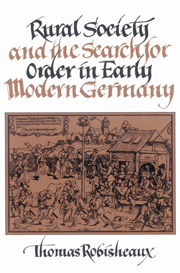Book contents
- Frontmatter
- Contents
- List of illustrations and tables
- Acknowledgments
- A note on usages
- Glossary
- List of abbreviations
- Introduction
- Part One Agrarian expansion, revolt, and the decay of community
- Part Two Search for order
- 4 Reformation, patriarchy, and marital discipline
- 5 Defending the patrimony
- 6 The unchristian economy
- 7 Threat of revolt
- Part Three Crisis and recovery
- Appendix A Distribution of wealth in Langenburg district, 1528–1581
- Appendix B Grain production and the peasant household
- Manuscript sources
- Bibliographical essay
- Index
6 - The unchristian economy
Published online by Cambridge University Press: 05 May 2010
- Frontmatter
- Contents
- List of illustrations and tables
- Acknowledgments
- A note on usages
- Glossary
- List of abbreviations
- Introduction
- Part One Agrarian expansion, revolt, and the decay of community
- Part Two Search for order
- 4 Reformation, patriarchy, and marital discipline
- 5 Defending the patrimony
- 6 The unchristian economy
- 7 Threat of revolt
- Part Three Crisis and recovery
- Appendix A Distribution of wealth in Langenburg district, 1528–1581
- Appendix B Grain production and the peasant household
- Manuscript sources
- Bibliographical essay
- Index
Summary
Whatever stability the strict control of landed property introduced in family and village social relationships was inadequate to contain the threat to agrarian order that came from another quarter in the sixteenth century: market relationships and new sources of commercial wealth. By the end of the sixteenth century lords and peasants in Hohenlohe no longer looked upon market activities as peripheral or supplementary to the local economy. Whether for good or ill the place of villagers in the agrarian order depended as much on securing cash incomes to maintain their social standing as it did on securing access to landed property. Established tenant farmers needed movable wealth, not land, to endow sons and daughters in their marriages. Young heirs also needed cash incomes to meet the heavy burdens of family inheritance claims. The village poor, even if they did not have to meet as burdensome a demand in inheritance obligations as did tenant farmers, certainly needed cash incomes to buy grain, bread, and other food supplies to survive. As the century wore on, in fact the pressure to secure cash incomes in the market economy would increase steadily as the princes levied a more regular burden of taxes. These burdens were to be paid, if at all possible, in cash.
- Type
- Chapter
- Information
- Rural Society and the Search for Order in Early Modern Germany , pp. 147 - 174Publisher: Cambridge University PressPrint publication year: 1989



